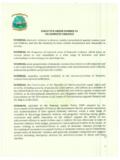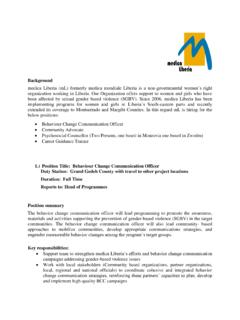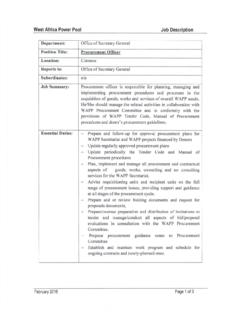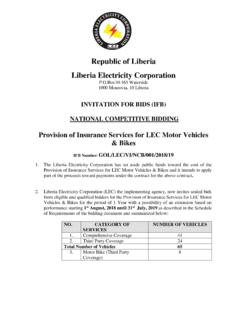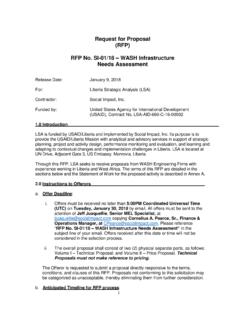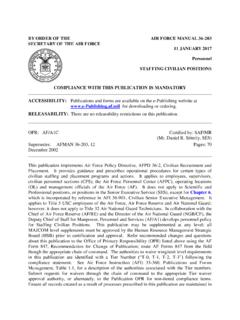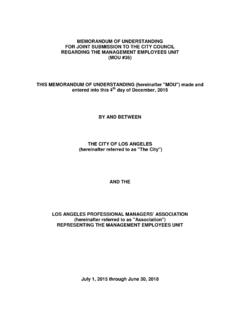Transcription of SCOPE OF WORK (SOW) - emansion.gov.lr
1 SCOPE OF WORK (SOW) WEST AFRICA BIODIVERSITY AND CLIMATE CHANGE (WA BiCC) PROGRAM In-Country Rapid Coastal Vulnerability Assessment Title: Coordinator Location: Liberia The project The West African Biodiversity and Climate Change (WA BICC) program is a USAID-funded five year initiative (2015-2020). The overall goal of WA BiCC is to improve conservation and climate-resilient, low emission growth across West Africa by focusing on three core components: 1. Combating wildlife trafficking 2. Improving coastal resilience to climate change 3. Reducing deforestation, forest degradation, and biodiversity loss. The WA BiCC strategy is to address both direct and indirect drivers of natural resource degradation to improve livelihoods and natural ecosystems across the West African region. WA BiCC will work in collaboration with 3 core regional partners the Economic Commission of West African States (ECOWAS), the Mano River Union (MRU), and the Abidjan Convention as well as diverse stakeholders on the local, national and sub-regional levels to develop, improve or adapt policies and practice that can contribute to West Africa s environment and development goals.
2 WA BiCC is a learning initiative that aims to work with partners to identify, synthesize, transform and disseminate knowledge, information and best practices to regional, national and local policy makers and practitioners. The Rapid Vulnerability Assessment Series of Coastal Regions in West Africa Rationale West Africa s coastal areas are home to about one-third of the region s people and the population is growing four percent each year. A very large proportion, about 42%, of West Africa s GDP is generated from its coastal areas. More than million tons of fish are legally captured in West African waters each year, with an estimated wholesale value of US$ billion. The coast hosts major cities, ports, agro-industries, fisheries, offshore petroleum exploration and production and experiences high population growth rates, partly due to its economic vibrancy and attractiveness. Climate change will exacerbate existing physical, ecological/biological, and socioeconomic stresses on the African coastal zone.
3 The coastal nations of west and central Africa ( , Senegal, The Gambia, Sierra Leone, Nigeria, Cameroon, Gabon, Angola) have low-lying lagoonal coasts that are susceptible to erosion and hence are threatened by sea-level rise, additionally exacerbated by potential rise in storminess leading to increased frequency of impactful storm surges and extreme wind events. Populations living in these areas will often be impacted in two ways: through the potential loss of their habitat due to land loss and salinization; and through impact on their livelihoods since changes in temperature and rainfall patterns will affect water quality and fisheries, most of these populations rely on. The understanding of, and accounting for the vulnerabilities to climate change of the populations living in coastal areas differs widely between countries, their data availability and expertise. Reports differ in approaches, resolution and details.
4 It is therefore difficult to provide a regional view of the vulnerability of the coastal areas of the Gulf of Guinea and inform regional initiatives and programs as well as National Adaptation Plans. The proposed work seeks to address this gap by carrying a series of vulnerability assessments of coastal regions in Guinea, Liberia, Ghana, Cote d Ivoire, Togo and Sierra Leone using the same approach, in order to provide a regional picture of the vulnerability of socio-economic and physical systems to climate change. The work will use a mixed methods approach to take advantage of existing information and expertise within each country, combined with acquisition of new data and insights that seeks to both: bring enough detail to allow vulnerability differentiation within each country and allow comparison between countries to inform regional stakeholders about vulnerability hotspots and greatest adaptation needs.
5 Approach The mixed methods approach seeks to tease out the most important elements of vulnerability by triangulating information obtained from different sources through different instruments. In particular, it will combine: 1. A desk review of existing information about climate change and coastal vulnerability, institutional set-up and existing adaptation projects 2. Key Informant Interviews at national level 3. Field data collection on coastal vulnerability Field data will provide a much needed from the ground perspective on the vulnerabilities of the populations that several of the target countries are currently unable to collect. In other countries such information may exist in reports and articles but may not be systematic or have climate change lens. The VA will be rolled out successively in different countries, following WABICC priorities, and funding and policy opportunities. As stated above the advantage of this study is to collect in a uniform manner data and information on the vulnerability of coastal regions that has enough resolution to be useful to national decision makers yet remain comparable between countries.
6 We will seek a strong involvement of national stakeholders and institutions. Methods The study will be composed of the following stages, all with a strong support from a local VA coordinator and involvement of local stakeholders and WABiCC: 1. Desk study: review, analysis and summary of all existing documents relevant to vulnerability of the coastal regions of a given country; this study will also include an institutional and on-going project review and a series of maps on satellite and other global data holdings; Among others it will provide: a new high-resolution of the land-use map based on satellite data and validated with in-situ data acquired during the field phase of the work; and a high resolution (settlement-level) population estimate within 2km and 5km buffers from the coast using new data produced jointly by CIESIN and Connectivity Lab at Facebook; 2. A series of Key Informant Interviews with professionals involved in coastal activities conducted jointly by CIESIN and the STTA in Liberia 3.
7 Field work to collect more detailed data on the vulnerabilities of the socio-economic and natural systems to climate change with support of a local field team; data will be collected on following topics: climate impacts, livelihoods and environment in approximately 10 locations distributed in various coastal types; approximately 3 in settlements of more than 2,000 people and 7 in settlements of less than 2,000 people, through Focus Group discussions, Key Informant Interviews and Extended Interviews with selected households or individuals. 4. Synthesis of the findings of the above, consultation with stakeholders Short Term Technical Staff Assignment Objective of the Assignment The Assignment is for an in-country coordinator for the Rapid Assessment of Vulnerability to Climate Change in coastal areas of Liberia (location TBD) as part of WABiCC activities to improve coastal resilience to climate change under component 2.
8 Its main objective is to assist CIESIN in the implementation of the rapid VA in Liberia. The Coordinator will work closely with CIESIN s VA lead S. Trzaska and project lead (Alex de Sherbinin). Consultant s set of skills 1) Master s degree encompassing following or similar expertise: a) Adaptation to climate change b) Social Vulnerability and Climate Change c) Interactions between society and environment d) Climate impacts on the society e) Development issues at local scale And demonstrated experience as field team leader over past three years. Or Bachelor s degree in similar domains and proven 10 year experience conducting field surveys in the socio-economic domains. Team-leader experience is preferred. PhD encompassing similar skills is a plus. 2) Familiarity with mixed methods in socio-economic and development domains. 3) Good knowledge of various institutions and organizations involved in coastal and environmental management in Liberia 4) Experience in organizing and facilitating workshops and focus groups 5) Experience in organizing field work: a) Experience in field work planning and logistics b) Familiarity with various socio-cultural structures and languages along the coast of Liberia c) Familiarity with institutional and authority structure and with the authorizations necessary to conduct field work 6) Excellent interpersonal skills 7) Excellent communication skills (written and verbal) Consultant s Tasks The coordinator will have the following responsibilities: 1.
9 Contribute to the desk review of coastal issues a. Identify in-country expertise in the various domains relevant to the coastal issues and gather information on existing research, reports and projects b. Identify and upload to an on-line repository all the documents relevant for the coastal VA, including unpublished reports c. Review and comment on the draft desk review working document 2. Compile a review of institutions and projects involved in coastal issues a. Compile a working report on institutions involved in coastal adaptation and management in Liberia b. Compile a working report on projects and interventions in the coastal areas in Liberia c. Identify the main national, regional and local stakeholders for the coastal VA in Liberia 3. Contribute to the Key Informant Interviews (KII) a. In collaboration with WABiCC and CIESIN, and based on the activities above, identify 10-15 Key Informants at national level for interviews b.
10 Schedule and organize the interviews c. Participate in the interviews and information analysis d. Participate in the writing of the working document synthesizing KII 4. Participate in the field work preparation a. In collaboration with CIESIN select field work sites based on the desk review and KII i. Contribute to site selection criteria development b. Contact relevant authorities to inform about the field activities and obtain authorizations c. Plan field activities and logistics d. Contribute to the hiring of field staff 5. Coordinate the field work a. Organize and contribute to pre-field work training b. Participate in the field work i. Insure everyday logistics during the field work, including contact with local authorities, accommodation, transportation, communication etc. ii. Contribute to the field work c. Organize and participate in the field work debrief 6. Participate in the field results draft report and review a.


